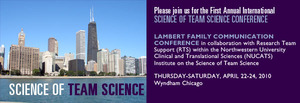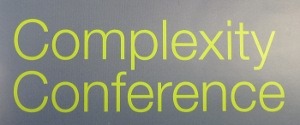Science of team science
April 26, 2010

Ah, spring. A time of growth, renewal, love... and conferences. Just one week after attending the NSF Design Workshop, I attended the first annual Science of Team Science conference at Northwestern University. The goal of the conference series is to bring together scientists, researchers, and practitioners that want to know how scientific teams work and how to assemble scientific teams more effectively.
Interestingly, one of the highlights among a slew of fascinating talks on successful scientific teams was a talk by by Howard Gadlin on teams that don't work well together. Gadlin is a mediator and conflict resolution expert, thus he primarily works with “broken” teams. One of his primary points was, to recycle his clever tweak to the opening line of Anna Karenina, “all unsuccessful teams are alike; each successful team is successful in its own way.” If that is true, as Gadlin convincingly argued, it poses a challenge to data scientists that are trying to identify statistical signatures of successful teams. Perhaps it would be more useful to study unsuccessful teams and try to discern what not to do.Also of note was a discussion during a panel of how the insight that was developed by many of the speakers would apply to teams in non-scientific contexts. Although the scope of the conference was limited to scientific teams, Gadlin noted that the same principles are likely to apply to other types of teams, as “scientists are very much like people.”






